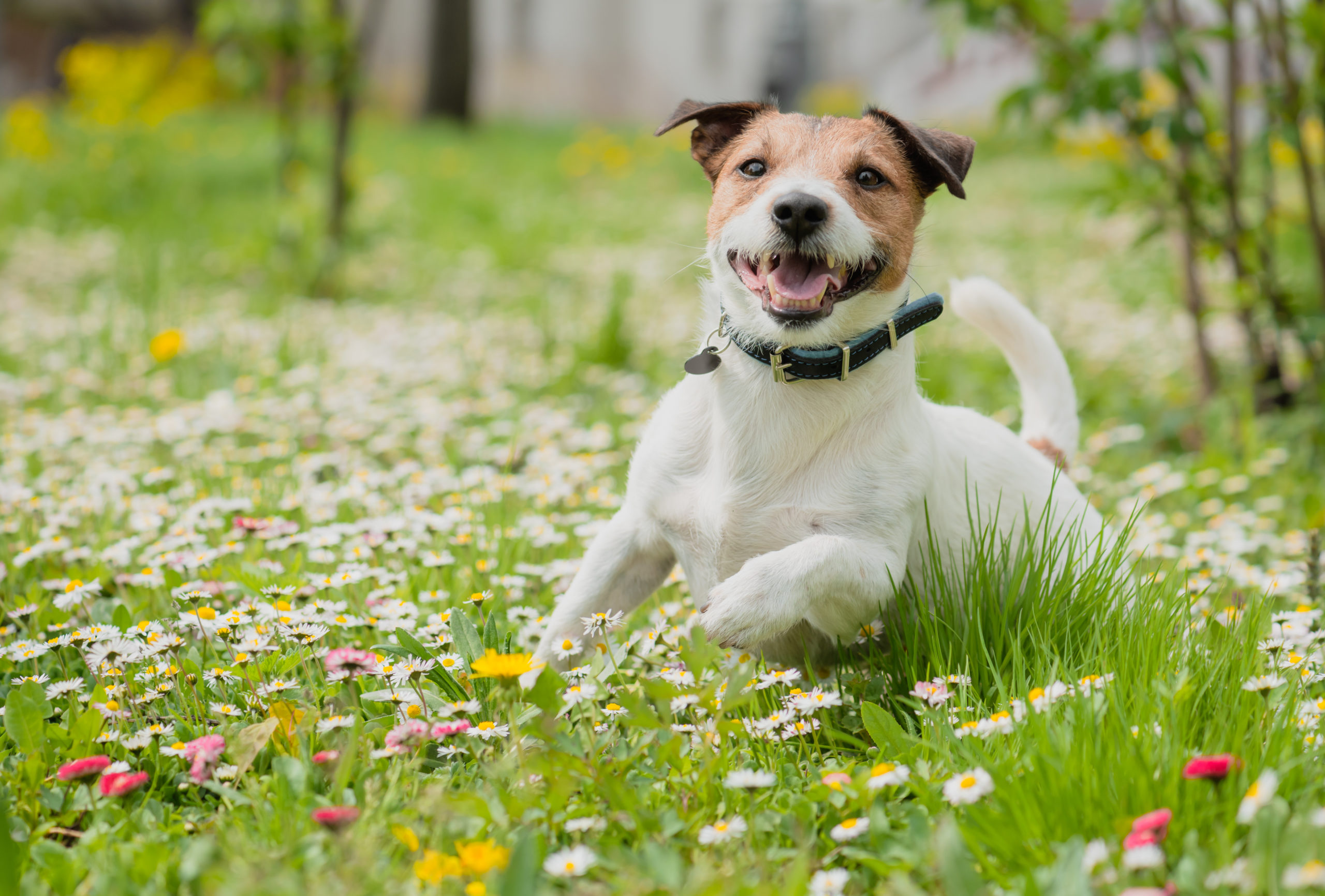Springtime dangers for pets

Spring is a fantastic time of year. The days get longer, the weather is usually better, and we are all outside more. This can be great for our pets! The new season does bring with it some potential hazards, though, and it is important to be aware of these so that we and our pets can have fun safely.
Easter treats
The shops are already filled with Easter eggs and hot cross buns. These can be extremely tempting to pets, especially dogs. It is important that animals are not allowed to eat them. Chocolate is toxic to all household pets and can cause them to become quite unwell. Dark chocolate is most dangerous due to its higher cocoa content. Ingestion of even small amounts can be very serious – potentially even fatal.
Hot cross buns contain raisins, sultanas, or currants which (like grapes) should be avoided in both cats and dogs. They can cause kidney damage and unfortunately some animals can become very ill after eating just a small amount of these fruits. If you think that your cat or dog has eaten something that they shouldn’t have, it is vital that you contact us as a matter of urgency. Do not delay seeking advice as early treatment can make a big difference.
Spring Plants
Springtime can be a great time for gardens. Spring flowers are starting to appear. Some of these plants can pose a risk to our pets. Daffodil, tulip, hyacinth, and bluebell bulbs can be poisonous to dogs if eaten, and other parts of the plants can also be toxic. Dogs who like to dig in the flowerbeds may be particularly at risk of ingesting things they shouldn’t. Animals should also not be allowed to drink water from vases which have contained flowers, as this may also cause them to become unwell.
Slug Bait
The sale of metaldehyde containing slug pellets is now banned in the UK. However, some gardeners will still have remaining supplies. These pellets are extremely poisonous and their use in gardens and areas where pets can access should be avoided. Eating just a few of these pellets can be fatal. Please call the practice urgently if you think that your pet has eaten slug pellets. Iron phosphate slug baits are a safer alternative, but these can still be harmful if ingested in large quantities, so it is best to avoid using these too.
Weedkillers
Weeds also like the warmer weather that spring provides and weedkillers might seem an easy solution. Unfortunately, they can contain ingredients that are dangerous to our pets. Paws or fur may become contaminated with harmful substances as pets walk across treated areas, then pets may ingest these as they groom. Rabbits or guinea pigs are also at risk if lawns are treated. Ideally weedkillers should be avoided all together. If you must use them, it is important to read the labels and follow any instructions very carefully.
Flystrike
Flystrike is a particular problem for rabbits, although it can sometimes affect other animals including cats and dogs. Flies are more common throughout the warmer months, and it is bottle flies that are of particular concern. Problems arise when they lay their eggs in the fur of our pets. These quickly hatch out into maggots which, if not treated swiftly, will cause significant damage to the skin. Fly repellent treatments can be supplied to reduce the risk of flystrike. Daily monitoring of your pet’s fur (particularly around their bottom) and ensuring that they are kept as clean as possible is very important. Flystrike is an emergency and early veterinary treatment is vital.
Adder Bites
The warmer weather will be enticing Adders out from hibernation. The Adder is the only venomous snake in the UK and can be recognised by a distinctive zig-zag pattern along its back. Adders are not naturally aggressive but may bite if disturbed. Dogs can be inquisitive, and this makes them at particular risk from bites. The face or legs are most commonly affected. Adder bites can be very serious – it is important to seek veterinary care immediately.
Bee stings
Bees are also seen in greater numbers over the spring and summer months. It is not unusual for curious animals to be stung by bees and this can be quite uncomfortable for them. Many bee stings will not be serious, but they can cause significant swelling in some pets. In these cases, or if your animal has been stung in the mouth or throat then please call the practice for advice.
Spring lambs
Lambs are now starting to appear in fields, and it is important to be aware of them if you are out walking dogs. Even well-behaved dogs can cause stress to livestock so, if possible, try to avoid walking near any fields where lambs may be present. Dogs should always be kept on a short lead whenever livestock are nearby.
We hope that both you and your pets have a thoroughly enjoyable and safe springtime!
Categorised in: News


